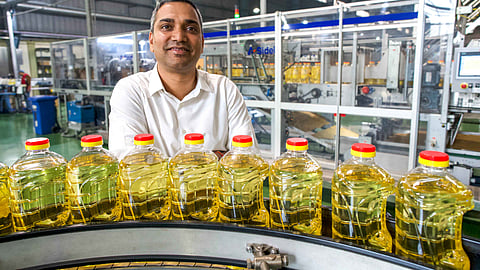
- Home
- EventsEvents
- Product Launches
- CategoriesCategories
- Advertise
- Opinion

FSSAI has issued an order asking the state food safety authorities to carry out inspections concerning the blending of mustard oil. The blending of mustard oil for multi-sourced edible vegetable oil production has been prohibited with effect from 8 June 2021. The notification further advised ensuring physical inspection of such units by visiting their premises to check any prohibited blending of mustard oil is being carried out post 8 June.
The FSSAI order stated, "To ensure that prohibition is effectively enforced across, all the Commissioners of Food Safety of states/UTs and central licensing Authority are requested to carry an inspection drive of all such units which were hitherto licensed for production of mustard blend edible vegetable oil (BEVO) or multi-sourced edible vegetable oil (MSEVO)."
Further, the state authorities were requested to approach the old licenses having BEVO as a product under your jurisdiction and advise them to get their licenses suitable amended given the said prohibition.
The state-wise list of such units licensed for blending edible oil was also given to the state food authorities for inspection purposes. At the same time, the state authorities were also asked to inspect any other unit which is not listed but involved in the blending of mustard oil.
Ashish Khandelwal, managing director, BL Agro Industries, commented on FSSAI's decision to ban the blending of mustard oil with other cooking oil. According to him, considering the current practices associated with blended oil, it was imperative to ban it in the public interest. He adds, "Blended oils came into existence keeping in mind value addition to the existing cooking oils. Any single oil does not contain the ratio of MUFA and PUFA as per the standards prescribed by WHO. So to achieve those standards, blended oils came into existence. However, what happened in India was that under this cover, people started blending substandard oils. This way, they could get their samples cleared. But these malpractices brought disrepute to the concept of blended oil."
Khandelwal said, "Now the new nomenclature - 'multi-source oil' is perfectly fine, but there should be one condition that only those people should be allowed to produce multi-source oil which are themselves producing at least one of the constituent oil. Only those having refineries of their own should be allowed."
"In the past, when people used substandard oil with mustard oil, the high pungency levels and the color of mustard oil covered up the poor quality of other oils. And mustard oil does not crystallize, so even if you mix it with any crystallizing oil, that will also work. So, people took advantage of this. They used 10% of mustard oil and 90% substandard oils. That is why mustard oil should not be permitted to put in any blend."
"Only refined oils should be allowed to blend, but in the case also there should be a condition that if 2 or 3 oils are being blended, one of the constituent oils should be produced by the blender themselves. And in any case, the rate of blended oil should be more than that of the initial oil."
"Earlier people misused this process to produce cheap oils, and that is the reason why major mustard oil players stopped making blended oils. Even BL Agro also stopped making bended mustard oil, although our blend was remarkable. The concept of blending mustard oil with rice bran oil was extremely good. So the permission may be given to produce such healthy blended oil like mustard and rice bran oil but with the condition that the producer of the blend should be either producing mustard oil or rice bran oil themselves," he concluded.
